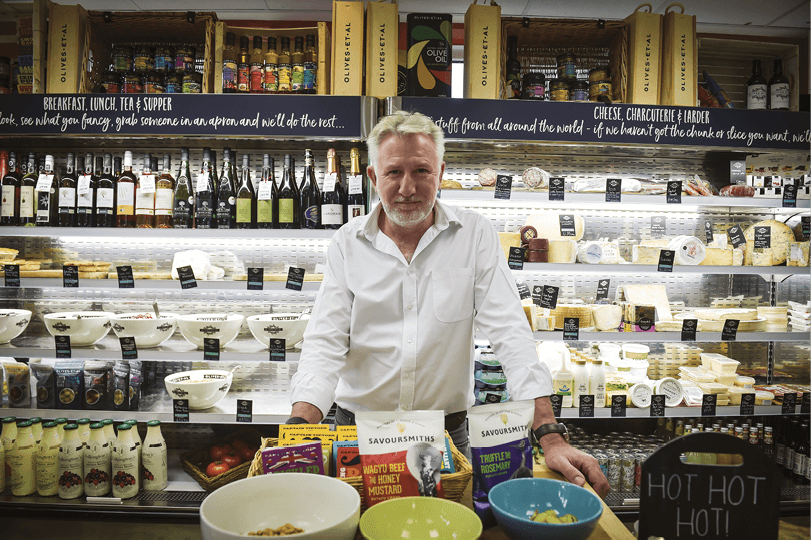Decision Magazine Interviews

What the owner-manager wants to do next?
Owner-managed businesses make a significant to the UK economy and their health and growth is vital for our long term prosperity. Ward Goodman are focusing on their priorities, concerns and aspirations and how we can help to address those key issues.
Over the last few years, we have been interviewing the key decision makers and owners of businesses in Dorset, that are key to understanding how these businesses are facing their challenges and what we can do to help them. A selection of these interviews are set out in this section of our website and we hope you will find them inspirational.
Which route to take at the crossroads
A problem entrepreneurs face in developing their business is that one of their character traits is that generally they want to be involved with everything.
“That,” says Ian Rodd, managing director of chartered accountants, tax, and business advisors Ward Goodman, “can result in the business only growing to a size where it doesn’t need outside expertise. The entrepreneur will still have ambition and ideas, but not the skill-set to go further forward.
“So at some stage they either sell out and perhaps start again, or they take on a layer of management for the tasks they no longer want to do.”
Those who have started their business after a corporate career at some point can deal with that scenario much better, suggests Rodd, because they are more likely to be familiar with the need to scale up by bringing in outside resources.

It can all come to head when the business reaches a crossroads for the first time, because the entrepreneur probably hasn’t had the experience to enable them to evaluate which direction to take. “Up to now it hasn’t been so much about business modelling or strategic options,” suggests Rodd. “They have a good product or service offering and business growth until this point has probably been the consequence of their ability to react to opportunity rather than being proactive strategically. Something comes their way, and they grasp it. Maybe that is all they can do because of their size, resource, and understanding, but eventually they will find themselves at that crossroads, and they have to make a choice.” The entrepreneur will always have more of a survival mentality than the CEO at a corporate, Rodd believes, because they really are where the buck stops. “They have to provide the ambition, the drive, because if they haven’t got it, their business doesn’t progress because there is no outside force, like institutional shareholders, that their corporate equivalent would have to keep them moving.
“The entrepreneur doesn’t have a blanket of security. They tend not to have a formal risk register. But the entrepreneur will thrive on vulnerability, and they like the thrill of the chase, otherwise they’ll be working for an employer instead.
“Successful entrepreneurs believe in personal development; they realise they have to grow themselves not just the business, and to take the business forward they need to be one step ahead because that is the only way you can lead. It’s about running the company rather than simply being in it – a massive essential if an entrepreneur is going to continue to enjoy what they are doing. It isn’t becoming increasingly mired in day-to-day operations and administration which gets them up in the morning.”
Business Magazine Interviews
Why did a small company put itself through a global accreditation process, which meant complying with 3300 different clauses – even though most of its customers would never have heard of the scheme? Giles, from Olives et al explains all.
“Owner-managed companies can run out of steam because they aren’t actually cautious enough,” suggests Lisa Rossiter, founder and managing director of Arnold Jones Associates Design. Hear what Lisa has to say about learning to walk before you run.
Primrose Matheson started to make up recipes for breakfast cereals and realised that just maybe, they could represent a business opportunity. A saturated market? “I didn’t think about things like that at the time,” she laughs. Read more about Primrose’s story.
So how does the managing director of D Stewart & Son, the garden centre, nursery, and landscaping business define his role? “My job is people,” he declares. Read more about Martin’s story.
Nothing too unusual about an owner-managed company having a set of values and a mission statement. But the co-founders and directors of Original Steel Services Limited have written a document that sets out how they would like the business to be run once they are no longer there.
Simon Notley could be described as a man with a mission.. He’d like to encourage people to see timber as the right material for building a house or an extension, not just as the ancestor of bricks and mortar. Read more about his company, Townsend Timber.
Someone once said to Trevor Smith that printers were a bit like plumbers – they take ages to quote, never do the work on time, and then charge more than they said. Read more about how Amberley Labels changed that.
“What has always fascinated me is understanding how business works, and seeing how it could work better with IT,” says Richard Austin, co-director of KFA Connect. Read more about how Richard learnt not to be afraid to try something new.
There’s one good reason why Phil Ford and Ian Stewart decided to set up their own company some twenty-five years ago. Read more about Copyrite’s success in looking for an opportunity!
“The thing about a partnership is that it is like a marriage; to get on there has to be give and take. The partners can be chalk and cheese but that can work if each has their own niche. There will be conflicts if people are passionate, and that is an indication that they’re engaged with the business.” David Lester was the longest serving partner at architects Williams Lester until he retired in 2017. Read his story here.
“It might sound laughably naive, but back in the nineties I had a vision of having a company which was the antithesis of how The Apprentice show on television perpetuated a stereotyped image of business. I have this belief that business can be done in a more linear than hierarchical way, that the machismo associated with success is outdated.” Read more about Emma Goss-Custard’s story.
Reference
- Arnold Jones Associates Design – ajadesign.co.uk
- Amberley Labels – www.amberley.net
- Copyrite Business Solutions – www.copyrite.co.uk
- Honeybuns – www.honeybuns.co.uk
- KFA Connect – www.kfa.co.uk
- Newton Forge – www.newtonforge.co.uk
- Olives Et Al – www.olivesetal.co.uk
- Original Steel Services (OSSL) – ossl.biz
- Primrose’s Kitchen – Primrose’s Kitchen
- Stewarts Garden Centres – www.stewarts.co.uk
- Townsend Timber – www.townsendtimber.co.uk
- Ward Goodman – www.wardgoodman.co.uk
- Williams Lester Architects – www.williamslester.com
Photography by Andys Scaysbrook www.andyscaysbrook.com

Book a Meeting
If you would like to discuss further, please book a meeting with an experienced member of our team. Simply let us know when’s best for you and we will get in touch to arrange a suitable time.
















